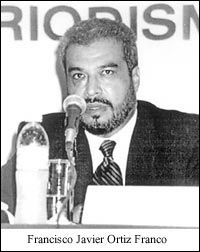New York, June 22, 2006—The Committee to Protect Journalists urged Mexican authorities to revive a stalled investigation into the murder of Francisco Ortiz Franco, co-editor of the Tijuana-based weekly Zeta, who was gunned two years ago today.
José Luis Vasconcelos, the leading prosecutor in the organized crime division of the federal Attorney General’s office, told CPJ that there had been no progress in the investigation. He said that the men believed to be behind the murder, Arturo Villarreal Albarrán (known as “El Nalgón”) and Jorge Briceño (known as “El Cholo”), were still at large. Authorities have issued arrest warrants for them on drug trafficking charges, he said.
According to CPJ research, 10 journalists have been killed since President Vincente Fox took office in 2000, four of them in direct reprisal for their work. Another journalist is missing and presumed dead. None of the cases has been adequately investigated, according to CPJ research.
In February 2006, Fox announced the appointment of David Vega Vera as special prosecutor to investigate crimes against the press, an important step towards creating federal accountability, and a message to Mexico’s vulnerable provincial journalists that the national government takes seriously its responsibility to uphold the constitution, which guarantees freedom of the press. Fox backed the idea of a federal prosecutor after a meeting with CPJ in New York last September.
“We are disappointed by the lack of progress in bringing those responsible for the murder of our colleague Francisco Ortiz Franco to justice,” said CPJ Executive Director Ann Cooper. “Although we recognize that the new prosecutor’s office has only recently started work, we are anxious to see concrete results. Mexican journalists won’t feel secure until the cycle of impunity is broken.”
Ortiz Franco was killed in broad daylight, only two blocks away from state police headquarters in downtown Tijuana on the morning of June 22, 2004. He had just left a physical therapy clinic with his two children when masked gunmen pulled up to his car and shot him four times in the head and neck. The journalist died at the scene; his children were unharmed.
Federal authorities, who took over the probe in August 2004, believe that Ortiz Franco was killed because of his work as a journalist, and they consider stories he wrote about the Arellano Félix drug cartel as the probable motive.
Vasconcelos said last year that one of Ortiz Franco’s suspected killers, Jorge Eduardo Ronquillo Delgado (known as “El Niño”), had been executed by fellow members of the Arellano Félix cartel in October, 2004.
In September 2004, a CPJ delegation visited Tijuana to look into Ortiz Franco’s murder. With information gathered during the trip, CPJ published a report in November that year titled “Free-Fire Zone,” describing how feuds between rival drug cartels over lucrative drug smuggling routes have endangered the lives of journalists, turning the Northern Mexican border into one of the most dangerous places for the practice of journalism in Latin America.
